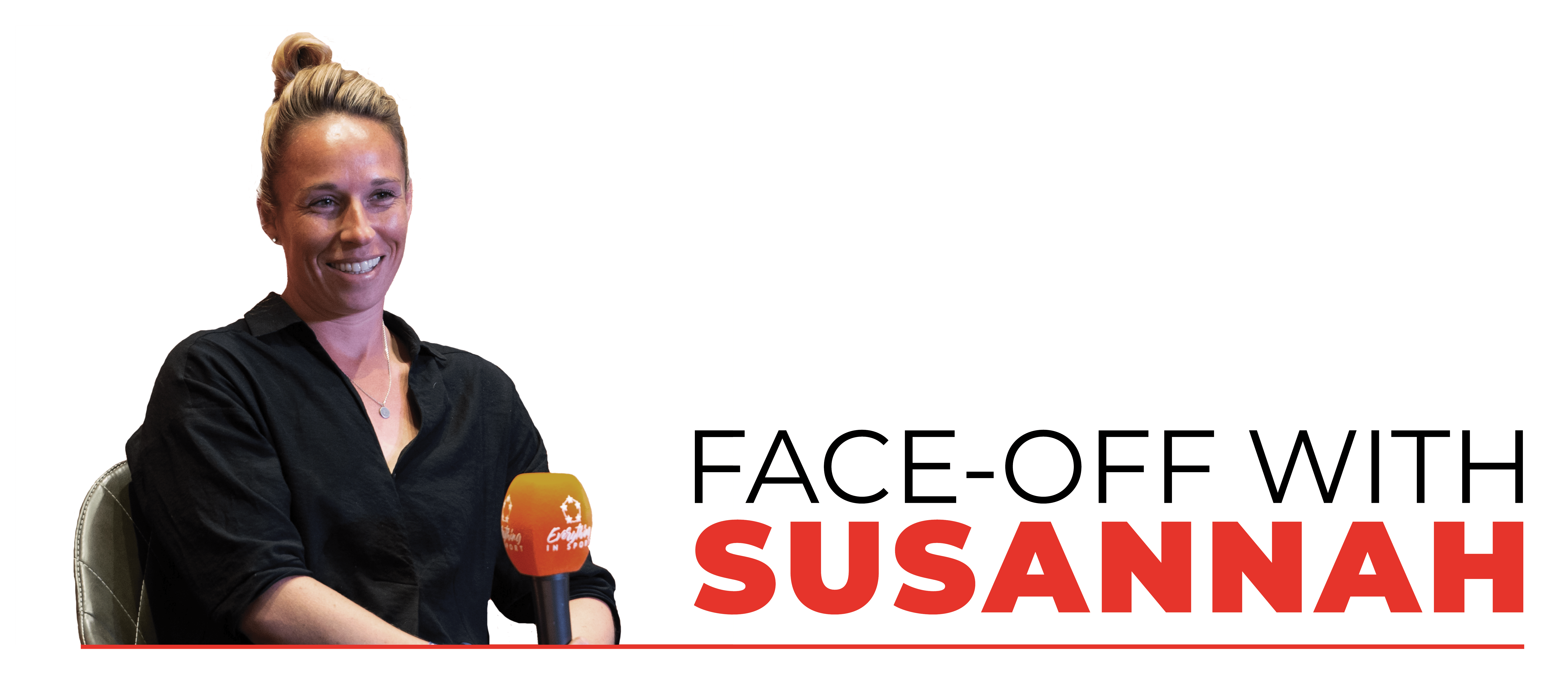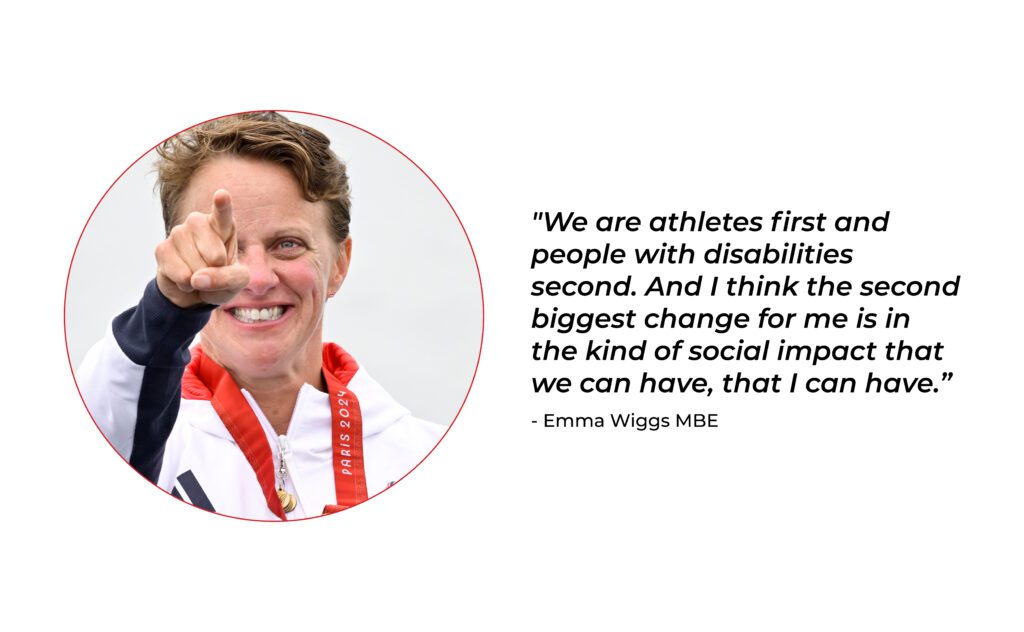

Emma Wiggs: From Adversity to Triumph – A Paralympic Journey of Resilience and Kindness
Emma Wiggs: From Adversity to Triumph – A Paralympic Journey of Resilience and Kindness
Susannah Townsend, MBE, OLY, an athlete and sports advocate, is conducting a series of interviews for Omnia Media with prominent figures in the world of sport to highlight their stories and contributions. Her second interview features Emma Wiggs, MBE, Triple Paralympic Gold Medallist, Twelve-time World Champion Paracanoeist and empowering motivational speaker.
Emma Wiggs opened the discussion by introducing herself with a mix of humility and humour. A three-time Paralympic champion and 12-time world champion, she added a light-hearted note about her Brownie T’s made badge, grounding her remarkable achievements in everyday relatability. Emma shared that she became disabled at 18 after contracting a virus that affected her arms and legs, forcing her to reshape her life. Despite the profound change, she found new purpose through Paralympic sport, which has taken her to extraordinary heights and taught her invaluable lessons along the way. Reflecting on her journey, she expressed gratitude for the opportunity to continually learn, even after years of battling through the physical and mental challenges of elite sport.
Emma’s story began with a deep passion for athletics during her youth, where hockey was her main focus. However, her life was dramatically altered during a gap year in Australia, where her plans were disrupted by her sudden disability. Despite initial struggles, Emma relied on resilience, support, and sheer determination to pursue her goals, earning a degree and becoming a PE teacher, despite societal biases against disability. Her breakthrough into Paralympic sport came years later, leading her to the London 2012 Games as a sitting volleyball player. This transformative experience reignited her competitive spirit and set her on a path to becoming a celebrated athlete on the global stage.
When reflecting on her journey into Paralympic sport, Emma Wiggs highlighted the significant changes in accessibility and awareness over the years. She recounted how, in 1998, Paralympic sports were scarcely covered in the media, making it difficult for even sporty individuals like herself to envision a future in the field. Emma, who had participated in every school sports club and team, shared how shocking it was that it took her 12 years after her disability to discover Paralympic opportunities. Emma explains her path into sport saying “So it was really because of London 2012, the British Paralympic Association were looking for people in the country that were disabled that may have had sporting talent.”
Emma also touched on the profound impact of self-belief in overcoming limitations, whether physical or psychological. She emphasised how self-limiting beliefs once held her back from recognising her own potential, even as a highly athletic individual. Emma says “I think that’s sometimes a lesson for all of us, whether it be disability or not. We can sometimes have these subconscious, self-limiting beliefs that really hold us back.” Grateful for the progress in attitudes and accessibility since London 2012, she acknowledged that the increased visibility of Paralympic success has inspired many. However, her story serves as a reminder of how deeply ingrained doubts can delay even the most promising journeys. Emma humorously noted that had she discovered Paralympic sport earlier, she might have completed eight Paralympic cycles by now—a testament to the importance of fostering confidence and opportunity for everyone.
Reflecting on the evolution of the Paralympic Games, Emma Wiggs highlighted the monumental shifts in visibility, societal impact, and personal lessons over the years, particularly from London 2012 to Paris 2024. She praised Paris for its exceptional execution, saying, “I think Paris did a phenomenal job. And I think we will unpick that. I think that there are two probably big changes for me. One is in terms of people’s interest in the Paralympic Games, which I think has been as monumentally different since London. I think before London, there was a bit of coverage.” Emma also discusses the ongoing transformation in the public interest, noting how Paralympic sports have grown from minimal media coverage—such as the brief highlights she watched as a teenager—to extensive, celebratory exposure on platforms like Channel 4. Emma attributed this progress to London 2012’s pivotal role in showcasing Paralympic athletes as world-class competitors first and foremost saying, “I think London has to take some real credit for that, for showing the world what Paralympic sport is.” Emma also goes on to discuss the changes she has seen in Paralympic sports saying, “We are athletes first and people with disabilities second. And I think the second biggest change for me is in the kind of social impact that we can have, that I can have.”
Emma shared insights into her personal journey to Paris 2024, detailing the challenges of maintaining top performance amid setbacks, including a significant shoulder injury that limited her preparation. Despite these hurdles, she approached the Games with a mindset centred on controlling what she could and embracing the reality of her circumstances, delivering her best despite not feeling at her peak. This experience reinforced her belief in the power of perseverance, adaptability, and the continuous learning process that helps unlock potential, both on and off the field.
Emma Wiggs and Susannah discuss the parallels between elite sport, business, and life, emphasising the importance of preparation, adaptability, and self-awareness. Susannah highlights Emma’s relentless dedication as a role model, drawing inspiration from her perseverance through setbacks and challenges, which motivates others to push themselves. Emma reflects on the need to manage expectations, sharing how she has shifted from striving for perfection to focusing on what she can give each day, whether in training, competition, or life. She recounts her experience in Tokyo, where defining success for herself, knowing a silver medal was likely her best outcome, allowed her to compete with freedom and pride. This mindset extended to her achievements in Paris, despite injuries, demonstrating the power of clear goals and acceptance. Emma stresses the importance of protecting one’s energy by avoiding unhelpful comparisons and negative thoughts, which can drain focus and motivation. Recognising that not everyone aspires to elite sport, she celebrates the value of accessible, social activities like park runs that promote physical and mental well-being.
When asked about accessible inclusivity in sport, Emma Wiggs acknowledges improvements but highlights there is still much progress to be made. She mentions initiatives like park runs with accessible options and a partnership between Paralympics GB and Toyota that allows individuals to find accessible sports clubs through an online postcode search. Emma says, “There is a better provision. It’s still not where it should be, but there has been a real step change in it, there will be park runs that have accessible options that are on tarmacked paths that are on better facilities than some of the others.” She encourages open communication between individuals with disabilities and organisers to collaboratively find solutions, as people with disabilities often know what they need. Emma also touches on societal awkwardness surrounding disability, urging people to engage rather than shy away. She emphasises the importance of kindness, compassion and communication, noting that a simple offer of help or willingness to have a conversation—however imperfect—can make a meaningful difference.
Reflecting on her own journey, Emma shares her aspirations for the future, which include recovering from shoulder surgery, continuing her athletic career, and expanding her work as a speaker, mentor, and consultant. She emphasises her passion for sharing the transformative lessons she’s learned through sport, believing they can benefit others in various aspects of life. Susannah praises Emma’s honesty and relatability, noting that while elite athletes often seem superhuman, Emma’s humility and openness make her truly inspiring. Emma humbly downplays her accomplishments, attributing her success to unique opportunities and her desire to share those experiences with others. Emma says, “It’s just that I’ve just had these amazing opportunities to learn stuff, and I just want to share that with people because it’s so powerful.” With a mix of humour and determination, she discusses her hopes of returning to full fitness, continuing to compete, and inspiring others with her journey, both on and off the water as she works towards the 2028 Paralympics in LA.
You can listen to the full podcast below:
